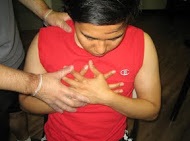Introduction
In most cases, a broken or bruised rib is going to occur when the person falls or experiences a hit to the chest. There are times in which this can be caused by coughing that is severe. These are painful, but the person usually feels better within three to six weeks. Most of the times broken or bruised ribs can be treated at home. These are not splinted or supported like other bones, and are left to hear on their own. You really only need to seek medical attention if the ribs are getting worse or the pain becomes unmanageable.
The Signs of Injured Ribs

The most common sign is that you feel severe pain upon breathing. You may find you can only take short breaths that are shallow to avoid this pain. However, it is important that you breathe normally to ensure that the mucus in your lungs does not cause any chest infections. There may also be bruises and swelling in the rib area.
How Bruised Ribs Occur
The most probable reason for bruised ribs is direct force to the chest. This thrusts the ribs against the adjacent muscles and the impact might cause bruising around the ribs. Though the injury is known as bruised ribs, most of the pain is a result of injuries to the adjoining muscles and rib cage
At Home Care for Broken or Bruised Ribs
You can take care of this problem at home. The main aspect is pain relief, as you want to avoid this pain every time you breathe or cough. Therefore, follow this advice:
- Take over the counter pain relief like ibuprofen or paracetamol as the dosage instructions say
- Hold an ice pack to your check during the first few days to help with swelling
- Rest when needed, as physical labor can make this harder
- Keep mobile, as you do not want to stiffen up and cause more issues. Plus, this can actually help with your breathing
- If you must cough, hold a pillow against your chest
- Utilize breathing exercises, such as taking 10 slow breaths every year to help keep the lungs clear
You will want to avoid bandaging the ribs tightly, as this will affect you being able to get a deep breath. In addition, you may find it impossible to lay down, so it may be better to sleep upright for a little while. Do not lift heavy objects or strain, and this can make the ribs hurt worse, and may affect how well you heal.
Related Video On Bruised Ribs
